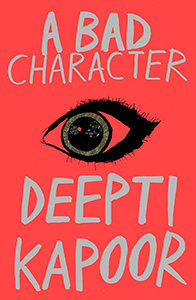Jonathan Cape, Random House
 Deepti Kapoor’s much-anticipated début, A Bad Character, is a timely comment on the state of modern Delhi from a female perspective at a time when incidents of sexual violence against women within the city are making international news with such regularity.
Deepti Kapoor’s much-anticipated début, A Bad Character, is a timely comment on the state of modern Delhi from a female perspective at a time when incidents of sexual violence against women within the city are making international news with such regularity.
A Bad Character is compulsive and its protagonist intriguing: twenty, motherless, desirous virgin, ‘serpentine’, aching for freedom, ‘a lump of wet clay’, open to ‘being shaped and devoured’.
Idha (not her real name) is the only character named at all. And so the tone is set, of unfolding mystery, suspended action and unspeakable things to come. Much is promised through teasing insinuation – ‘before all this happens’ – as though the narrator’s life has been irreversibly carved into two parts: before and after. ‘It’s what they’ll say about me too, when they know what I’ve done’. The narrative hook is in; Kapoor has our attention.
In her car and on her feet, Idha pushes and pounds the streets. There is a hunger in her, to escape her stifling existence, Aunty’s kitty parties and inane soap operas, the NRI mummy’s boys sizing her up for marriage prospects, the staring eyes of Delhi’s men, women too, vapid friends who do not understand her – ‘the world keeps turning, but no one know what turns in me’. She runs with ‘bursts of hope, desperation, burning up the energy that has nowhere to go.’ All the time, she remains alert to her survivor’s sense that this predatory city, ‘Delhi is no place for a woman in the dark unless she has a man and a car or a car and a gun.’
The man, when he comes, is ugly, bestial, mad, sexy and inevitably destructive. This is the appeal – ‘I am pretty and he is ugly. And the secret is this turns me on.’ What ensues, with this ‘wild animal dressed in human clothes’, is a three-week frenzy of mad abandon, love, lust and drug induced highs. His death is pointless and leaves a gaping hole in Idha.
Kapoor’s descriptions of sex are surprisingly frank but never pornographic or superfluous. The geography of Idha’s body becomes submerged with the city itself in the narrator’s mind– ‘He wants to show me every inch of the city, wants to exhaust me, fill my body with it, wants me to know.’ But this as a metaphor never quite works, and that is because by this point the narrative based around Idha’s relationship loses lustre. What, in counterpoint, gains momentum is Kapoor’s detached evocation of Delhi.
Idha’s Delhi is a ‘sulphurous dark…void of empty air’. Through her narrator, Kapoor serves up an unflinching, raw and equally balanced, between love and awe, impression of what it is to be a woman in modern Delhi. The moon-faced, motherless mirror image of Idha in the apartment opposite, dies escaping her situation, splattered on the road for all to see.
Yet there is a resounding soulfulness in the morning prayers, Khan Market, the thicket maze of streets, the hypnotising qawalli of Nizamuddin and the threshold of the dargah. This, juxtaposed with the soulless blocks of Punjabi wealth, rotting garbage, emptiness of obscenely moneyed Gurgaon and ‘the hacking phlegm in the throat that is the song of India’, is jarring.
Kapoor can turn a poetic phrase with adeptness. Her time working with various magazines and newspapers, scouring the streets of Delhi for stories feeds this well. Her jabbing, staccato style, which can appear disjointed, at times burns and hums with a Plathesque charm:
The city is close to me now, I think I know it. Millions of lives, hearts, lungs, arms flailing and stabbing, begging, beating pleading, praying, pushing gums against teeth, teeth against flesh, tongues lolling, bodies rubbing in the dark, drunk, fraying, frayed hems on clothing, loose stitches, goats, chicken, one great cry, the scent of it, the red dust and diesel in my nostrils and my mouth. I think I know it all.
The ending of this coming-of-age novel is an anti-climax. Little of the promised action is delivered. Although Kapoor’s writing is alluring and fresh, the subject is self-indulgent and shallow. Other than an exciting relationship with a disturbed man followed by a less-satisfying affair with a businessman, Idha remains having ‘gone nowhere and done nothing’; Kapoor’s sex and drugs are not convincing as other places, other pastimes; the protagonist’s emotional development even less so.
However, as a fleeting view from a passing car window, of one of the most populous, excessive, extreme and fast propelling cities in the world, A Bad Character is heady, energetic and vibrantly alive. And as a comment on middle-class Indian prejudice and oppression, it is astute.











